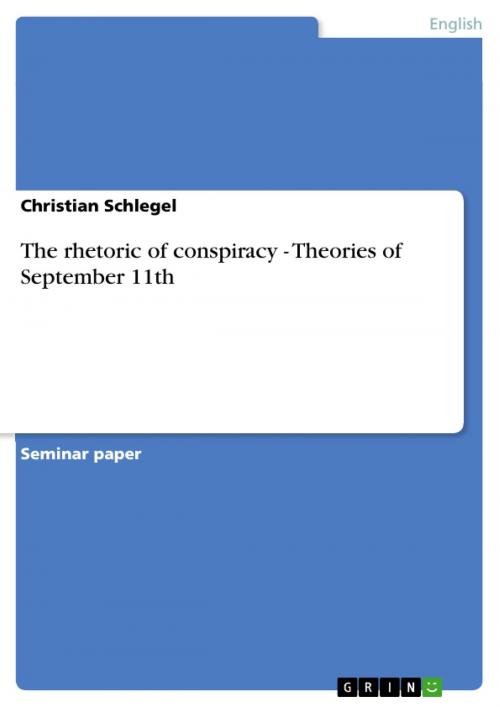The rhetoric of conspiracy - Theories of September 11th
Theories of September 11th
Nonfiction, Entertainment, Drama, Anthologies| Author: | Christian Schlegel | ISBN: | 9783638827997 |
| Publisher: | GRIN Publishing | Publication: | July 23, 2007 |
| Imprint: | GRIN Publishing | Language: | English |
| Author: | Christian Schlegel |
| ISBN: | 9783638827997 |
| Publisher: | GRIN Publishing |
| Publication: | July 23, 2007 |
| Imprint: | GRIN Publishing |
| Language: | English |
Seminar paper from the year 2003 in the subject American Studies - Miscellaneous, grade: 1,7, Johannes Gutenberg University Mainz (Englische Philologie), course: Paranoia in American Literature and Culture, 19 entries in the bibliography, language: English, abstract: On September 11th 2001 the terrorist attacks in New York and Washington, destroying the World Trade Center, heavily damaging the Pentagon, and killing almost 3.000 people, shocked the world and had a lasting effect on national and international politics of the United States. In short time, thousands of websites appeared on the internet and are still online, each offering its own truth about what had happened: Some claim having seen Satan himself in the flames and the smoke that rose from the burning twin towers, saying that the attack was just the beginning of the end of the world. Others use anti-Semitist sentiments and report about a Jewish plot following Zionist ideology. Again others blame the US-government for not preventing or even carrying out the attacks in order to justify their later wars on the Taliban regime and on Iraq. Some even talk about the involvement of an alien race. This seminar paper will begin by providing a theoretical background on conspiracy theories and suppose a thesis how those theories influence people and seduce them to believe. Rhetorical features will be taken into account as well as psychological features. After the outlining of the theoretical background, an overview of several conspiracy theories, connected with the events of September 11th 2001, will be given. Each theory will be individually discussed and examined in regard of its use of language and how historical facts and findings are mixed up with clichés and biased subjective opinions of the authors. In the end there will possibly be a common scheme to identify of how the writers and publishers of such theories succeed in winning so many supporters.
Seminar paper from the year 2003 in the subject American Studies - Miscellaneous, grade: 1,7, Johannes Gutenberg University Mainz (Englische Philologie), course: Paranoia in American Literature and Culture, 19 entries in the bibliography, language: English, abstract: On September 11th 2001 the terrorist attacks in New York and Washington, destroying the World Trade Center, heavily damaging the Pentagon, and killing almost 3.000 people, shocked the world and had a lasting effect on national and international politics of the United States. In short time, thousands of websites appeared on the internet and are still online, each offering its own truth about what had happened: Some claim having seen Satan himself in the flames and the smoke that rose from the burning twin towers, saying that the attack was just the beginning of the end of the world. Others use anti-Semitist sentiments and report about a Jewish plot following Zionist ideology. Again others blame the US-government for not preventing or even carrying out the attacks in order to justify their later wars on the Taliban regime and on Iraq. Some even talk about the involvement of an alien race. This seminar paper will begin by providing a theoretical background on conspiracy theories and suppose a thesis how those theories influence people and seduce them to believe. Rhetorical features will be taken into account as well as psychological features. After the outlining of the theoretical background, an overview of several conspiracy theories, connected with the events of September 11th 2001, will be given. Each theory will be individually discussed and examined in regard of its use of language and how historical facts and findings are mixed up with clichés and biased subjective opinions of the authors. In the end there will possibly be a common scheme to identify of how the writers and publishers of such theories succeed in winning so many supporters.















